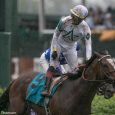By Ray Wallin
Are you that person who can’t remember what your spouse asked you to get from the store? Did you forget what you had for breakfast by mid-morning? Did you already forget why you clicked the link to this article.
It is not surprising since chimpanzees, our distant primate relatives, forget an event after about 20 seconds. Even man’s best friend forgets things after about two minutes. Are you surprised that you can’t remember what your wife asked you to get her from the kitchen?
People are always saying that it is bad to have a short term memory problem. For handicappers however, it is a positive to train your brain to be selectively forgetful in the short term.
Less emotional plays
Our friend Rail Guy is the kind of guy who can’t let anything go. After he loses the first race of the day, he is hanging around the paddock at Monmouth Park talking to anyone who will listen. “Dat four hoss in da first was robbed, dat bum jockey couldn’t ride da cart horse, deez stewards wouldn’t know a foul if it hit dem in the face.”
He could go on all day about the outcome of the first race. In fact, he does. By the end of the card, he has no bankroll left and is still cursing the jockey and stewards for the outcome of the first race. Chances are when you see him tomorrow before the start of the racing day, he’ll still be sore about what he perceives as another bad beat.
If you can train your mind to forget the outcome of the last race before you put your efforts into the race that is now at hand, you will have a clearer mind. You won’t be swayed by your anger or emotions. You’ll avoid making rash decisions either with the size of your wager or deviate from your planned bets on the best opportunities of the day.
Increases enjoyment
I have always wondered why guys like Rail Guy keep coming back to the track day after day if they get so angry when they don’t win. Having spent a good portion of my life with all sorts of degenerates and strange characters, I don’t know that I have ever seen them really enjoy their day the races.
While I am a firm believer in treating your wagering as a business transaction or investment, you need to enjoy the sport for what it is. I love attending the races when I can and even when I don’t have any great betting opportunities. I enjoy being outside. I enjoy talking to the horsemen and seeing the horses up close. There is something therapeutic about listening to the sounds of the horses making their way to the finish line and seeing the excitement in the winner’s circle.
A couple of bad beats shouldn’t ruin your day at the track. Soak in the experience every chance you get, even when you don’t have a buck on the outcome. Remember, you could be sitting chained to the desk at work instead.
Anchors away
All of us have a track buddy that drives us nuts. Unbending Andy is that track buddy for me. He’s a good sport and loves to head to the track. His ritual though is to buy the track program on the way in and before he looks at the past performances, he reads Track Handicapper Tommy’s picks and analysis. This will guide his bets all day. Unbending Andy loves to try to talk you into his selections, which are of course Track Handicapper Tommy’s selections. When Track Handicapper Tommy has a good day, Unbending Andy has a good day. When Track Handicapper Tommy has a bad day, so does Unbending Andy.
Most people favor the first bit of information that is given to them regardless of what subsequent information is given to them. This is called anchoring bias. Unbending Andy can’t get past the picks provided in the day’s racing program. Once he sees them, they become the anchor for his plays all day.
You need to train your brain to either skip the pundit’s selections and dive right into your own handicapping or be able to at least challenge the track handicapper picked if you plan on using them in your decision making.
Avoids confirmation
We aren’t talking about a 13-year-old here who hates going to church. We are talking about a guy like Unbending Andy. Instead, this guy Non-Committal Cal has a few plays he likes when he gets to the track and many that he doesn’t feel good about. That all changes when he hears Rail Guy or Track Handicapper Tommy tout one of the horses he kind of liked as one of their contenders. Knowing that someone else is on the horse he was lukewarm about makes him change his mind and make a horse that wasn’t a play consideration a few minutes ago into a solid contender in his mind.
This is a perfect example of confirmation bias which is the tendency to interpret new information as a confirmation of one’s owns beliefs. You are justifying the play to yourself based upon the opinions of others and not your own intuition and logic.
Like anchoring bias, you need to train your brain to stay focused on your solid handicapping and not let the opinions of others enter into your contender selection or decision to wager on the race.
The lone drawback to having short term memory loss is that you may forget where you put your voucher (which I am sure is in your shirt pocket where you always put it). I’m not suggesting that you should intentionally become forgetful in all aspects of your life but train your brain to be selectively forgetful. By forgetting your short term emotions and what you have seen or heard recently you will be well on your way to your dream of making your living playing the races.




